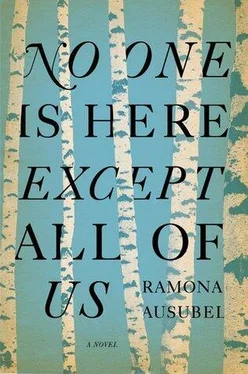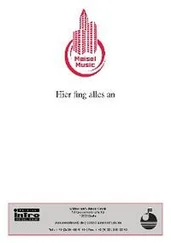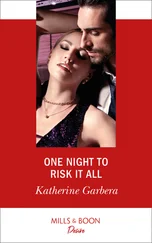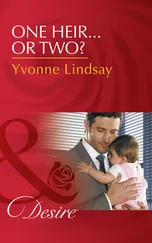“I’m going to beg you every single day for the rest of time. The entire world is yet to come and we’ll never be part of it. Kayla will die and I’ll die and that will be all. Do you understand?” He began to cry. “It will never matter that we existed.”
“Help,” my mother said.
“We all have the right to love something more than ourselves,” Hersh said quietly. “We all have the right to die of sorrow when something happens to our babies.”
“You want my daughter so you can lose her?” my mother asked.
“I want your daughter so I can keep from losing her. So I can break my fingers if it helps her. So I can bury my face in her hair when I sing to her. So my wife does not turn to dust. Give us hope. Perl, my sister, give us something to pray for.”
My mother looked at the heads rolling everywhere in the house. Two cabbages were resting against the big blue door, like dogs waiting to go out. I could tell that our mother’s own head was thick, filled up with mud. The mud wrapped its big, suffocating arms around every logical thought.
“Come back tomorrow,” my mother said.
I ran out the door and down the street. My feet smacked the puddles hard. I thought about running away forever, except that the whole point was to be home. I spotted my father in the square near the statue of the long-dead war hero with a bunch of other rain-wet men. I wrapped my arms around my father’s leg. He looked at me in confusion, but then patted my head and said hello. He did not know that a deal was under way to sell one of his children. The men, having finished their lunches but unready to return to work, were arguing over the fate of a typewriter. Around us, people walked from shop to shop, carrying baskets and bags of supplies. There were weak fingers of light coming through the spaces between buildings. The baker held the old black typewriter, tapping the S key with his ring finger. Should this be part of the new world? Should it be thrown to the bottom of the river, as the butcher suggested? Should it be stomped to bits and sprinkled over the tomato gardens? Should it be encased in glass and viewed as a museum object — evidence of an unknown time? Or should it be what the barber said it was — a clacking record keeper, inherited and benign?
People snarled, angry about the disagreement. “A lot of fuss over a few buttons,” the barber said.
“How are we supposed to know what to do?” the jeweler cried.
“Starting over is starting over,” the butcher spat as he stamped a boot-shaped puddle into the mud.
“Is it better to give the next generations the opportunity to invent new things, or is it better to provide them with the tools that were here when we arrived?” my father asked.
Igor said, “We’ll take whatever we can get.”
The typewriter was only one of the items in question. People disagreed about cash registers and hammers. If we threw out our hair ribbons, should we keep our shoelaces? What about our buttons and watches? “We have not gone back in time,” the baker said, “we have gone somewhere in time that no one has ever been . A brand-new place. Those watches cannot keep track of this place any better than a hairbrush could. We need to get rid of the watches.” He put the typewriter down on the ground, took his black felted-wool hat off and shook the rain out of it.
The barber agreed. “He’s right. This hat is a new world hat now, just as my eyes are new world eyes. But time roots us to the old world — time must never have existed before. Everything depends on that.”
All the glass faces stared back from a wheelbarrow in the middle of the square, ticking down hours that we denied even existed. The watch killers followed the cart past the butcher shop, the bakery, the bank, the candy store, six houses, four wet dogs, a row of white rosebushes, to the path through the cabbage field toward the river. The river garbled, and the rain tickled our foreheads and the backs of our hands as the men tossed our watches one at a time into the rocky blue. The past and the impending future were buried together like a pair of stillborn twins. The typewriter went in too, but not before the barber could kneel on the bank of the river and type the word goodbye . The watch chains made snaky chimes as they hit the water. We did not see a single watch or clock stop ticking; we did not see those faces crack and fill with liquid.
On shore, all we saw was a time-empty cart with a big wooden wheel. No markers of what approached or what had been. No counting up or counting down. Igor looked worried, aware of the vast emptiness ahead of him, the land of the uninvented. The jeweler’s eyes were panes of glass, easy to see through. In his mind was a man with a row of glinting needle-tipped tools and a pocket watch, its chest open and its metal heart revealed. The man, who had once been the jeweler’s father, was a lost ghost now and all of time silent at the bottom of the river. “Well, that’s one thing done,” said the jeweler, chewing his knuckles and hoping that he could support himself with wedding rings and child-size lockets alone. And what was to ensure that those would not be cast out? “Let there be wedding rings and child-size lockets,” the jeweler muttered. He remembered the small radio, which had kept him company for thousands of evenings since his parents died and his brother had gone off to seek his fortune. Now those people had been banished from existence, the past no longer a place. He was sure that radio too would be eliminated, but not if no one knew of it. The jeweler planned to hide it under the rotting floorboards of the old barn, where it would be safe.
I gazed out at the unchanged river and hoped we remembered to save more than we gave away. Already, cash registers and horse plows were named as traitors. Bicycles would be blacklisted, non-blank books. Anything with a wheel or a switch would soon sink to the bottom of the river, where the mud would hold it prisoner, shut it up.
The group looked up at the cloud-hidden sun, which had sunk to the side a little, making short shadows at our feet — small gray versions of ourselves who accompanied us back to town and shivered every time we crossed the mottled light of elm trees.
Living in the new world would not turn out to be that different from living in the old one. We had to survive with only the food we could grow and make ourselves, and the clothes we could knit or sew from fabric we already had. If a dish broke, there was no replacing it. But we found that it was not difficult. We had plenty of stuff. There were many bags of flour in everyone’s cellars, the cows and goats gave enough milk for us all to drink and make cheese with. As long as they kept reproducing, we could slaughter an animal every few weeks without diminishing the herd. Instead of trading with other villages, we traded with one another. Someone always had more forks than he needed, but not enough butter. One woman was always willing to offer a big bowl of soup and a loaf of bread if another woman would watch the children for a few hours. There was not enough chocolate, but we had a lot of sugar to make cakes. Beyond any accounting, we had the feeling of abundance — our world brimmed over.
What disappeared completely, no leftovers, no crumbs, was news. For us, there was no outside world.
My mother served bowls of cabbage soup that evening. She put out the spoons. We children sucked and slurped, the whole room full of the sounds of our mouths, trying to create too much noise to talk over.
Our mother said, “Regina is going to go and live with her uncle and aunt.” I hated myself for the relief I felt when my name was not the one spoken.
“What uncle and aunt?” our father asked, his eyes full of sharp surprise.
Читать дальше












